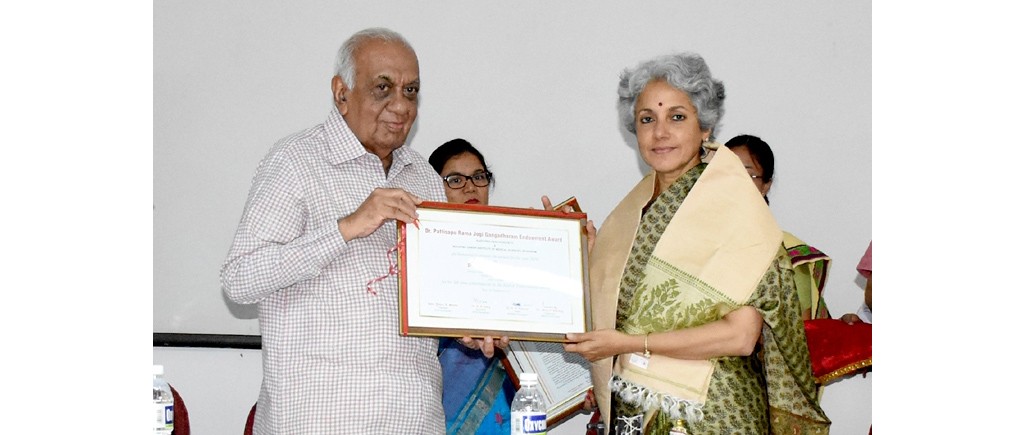Dr Soumya Swaminathan, Secretary, Department of Health Research Ministry of Health and Family Welfare and Director General Indian Council of Medical Research, New Delhi was conferred the Pattisapu Rama Jogi Gangadharam award for the year 2016, the 17th in the series. This award was presented at the hands of Shri D S Mehta, President Kasturba Health Society at a program organized by the Kasturba Health Society and Mahatma Gandhi Institute of Medical Sciences on 22nd September 2017.
Dr. K R Patond, Dean MGIMS welcomed the Guests which included among many dignitaries Dr Ram Pattisapu and Dr Kameshwari Konduri, son and daughter of Dr. Gangadharam who had come from United States to be a part of the ceremony.
Dr Pratibha Narang, Chairperson of the award committee, informed that the award was instituted at MGIMS by Late Mrs Shakunthala Gangadharam in the fond memory of her husband Dr PRJ Gangadharam, who was an international figure, having devoted all his life towards tuberculosis research and control. Mrs Gangadharam chose MGIMS as her husband was greatly inspired by the tuberculosis work being carried out in the institute under the guidance of Dr Sushila Nayar, Founder of MGIMS. The award is presented annually to an Indian scientist who has contributed substantially towards the fight against TB. The award carries a citation, a certificate of honour and cash of Rs. 25, 000/-.
Dr Soumya Swaminathan is the daughter of “Indian father of Green Revolution”, Dr. M. S. Swaminathan and Indian educationalist, Mrs. Mina Swaminathan. She is an internationally acclaimed figure in the field of tuberculosis having represented the country in many meetings and conferences abroad. A paediatrician by qualification Dr Soumya joined National Institute for Tuberculosis Research then TRC, Madras, in 1992, became the Director of the Institute in 2012 from where she rose to her present position on 17th August 2015.
Her work interest includes both paediatric and adult tuberculosis along with HIV-associated TB. Her research has expanded the knowledge base of TB/HIV co-infection in India, providing data about epidemiology, pathogenesis and best treatment and prevention strategies. Some of her research findings that had direct policy relevance include determination of composition and cost-effectiveness of TB treatment and prevention regimens in HIV-infected persons, dosages of TB drugs in children in relation to genotypic and phenotypic variables, nutritional supplementation to improve HIV survival and establishing re-infection to be a cause for TB recurrence. She has reported on pharmacokinetics and interactions of antiretroviral and anti-TB drugs along with incidence and risk factors for both TB and HIV drug resistance. Her team has also undertaken socio-behavioural research in the areas of HIV-related stigma, gender issues, treatment adherence, and novel risk reduction strategies among men who have sex with men.
Shri Dhiru S Mehta ji, in his presidential speech expressed concern over the ever increasing number of multi drug and extremely drug resistant tuberculosis cases which were posing a great hurdle in controlling the disease. He hoped that the recently introduced new drugs to treat these cases will be used judiciously by all clinicians so that the bacteria do not become resistant to them as well. He also referred to the need for high protein diet as a supplement along with the drugs. He congratulated the government for introducing newer diagnostic technologies at various levels for rapid diagnosis of the disease and for making them free of cost. He further emphasised that in order to see the end of the disease we all need to consciously commit ourselves to the use of newer diagnostics and proper guideline for treatment. Above all the patient must commit themselves to taking the full course of medicines, uninterrupted in order to completely cure themselves and avoid the disease from becoming resistant to drugs.
Replying to the felicitations, Dr. Swaminathan in her very lucid and comprehensive talk on “Tuberculosis: Challenges and solutions for the 21st century” illustrated the TB burden in the country and enumerated the efforts that would need to be put in at multiple levels in order to achieve elimination of the disease. There is a need to identify and address social, environmental, behavioural and economic risk factors. Malnutrition, alcohol, overcrowding, air pollution, occupational hazards, HIV, drug resistance, were some of the important contributing factors impeding the progress towards reduction of disease burden. She touched on some newer tools in the pipeline, like the new drugs, diagnostic technology, point of care tests and vaccines. She said, India needs to invest and research these new tools and her office in Delhi was focussing on these key health issues that are likely to have public health impact.
Dr Vijayshree Deotale, Organising Secretary and Head of the Department of Microbiology, proposed the vote of thanks.

